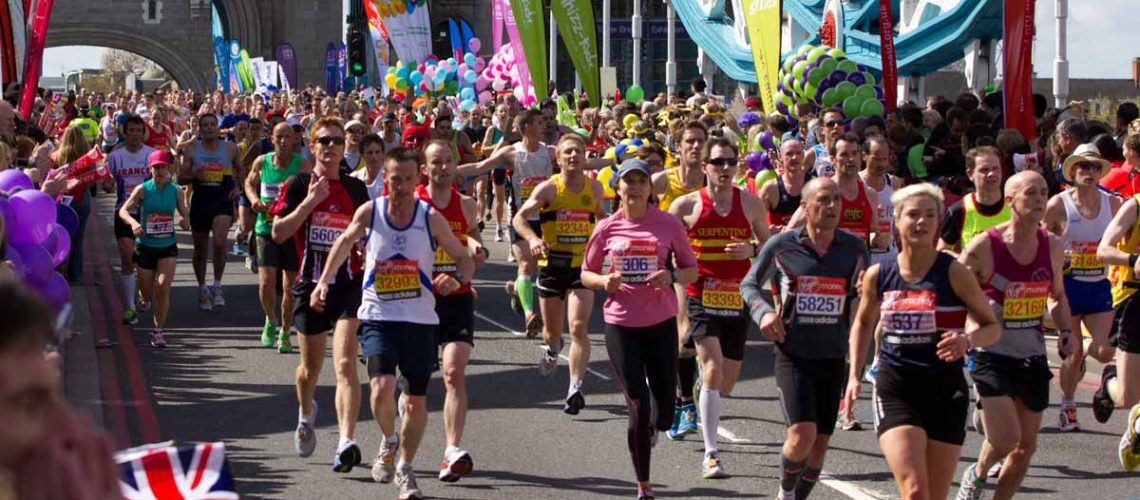
You’ve taken the challenge and registered to run the London Marathon – congrats! As you navigate training, there’s a good chance you’re feeling overwhelmed by the information about preparing for your big day.
Sure, you’ll need to put in some hard work and training – but if anything should be inevitable when embarking on a marathon, you’ll need to train smarter, not harder! Too many would-be marathoners fall into the trap of overexertion and burnout before the race even begins.
Please avoid all these things and have a fantastic race day experience. So let’s help ensure that your preparation is both practical and enjoyable. In this article, we’ll dive into key aspects of marathon training – from nutrition, recovery and pacing tips – so you can reach the start line faster, fitter and healthier.
Preparing for a marathon is no easy feat. It takes months of dedication, planning and hard work—all leading up to one big day (or shall we say, 26.2 miles). But with the proper training and preparation, you can ensure you’re ready to take on this feat confidently!
The London Marathon has been held every year since 1981 and is one of the most popular marathons in the world. On race day, you’ll run through some of the most iconic sights of London, from Tower Bridge to Buckingham Palace.
The course for the London Marathon is relatively flat throughout and consists mainly of asphalt and roads, marked out clearly with arrows to guide runners in the correct direction. Knowing this information will help you plan your training accordingly by doing more runs on roads similar to those you’ll be running on race day.
So, you want to train for the London Marathon? It’s an ambitious goal, but you can make it happen with the right plan.
The key to marathon training is consistency and progression. Start by gradually building your mileage, with easy runs during the weekdays and longer runs on weekends. Aim for a ten per cent increase in mileage each week or two—no more! This slow and steady approach will ensure that your body can handle the increasing mileage safely and effectively.

It would help if you also aimed for variety in your training sessions, alternating long runs with tempo runs (where you maintain a faster-than-usual pace for a select distance), interval training.
(where you sprint at maximum effort for a short distance before slowing down) and hill work. This combination of speed and terrain will help build strength and endurance quickly.
Remember: train smarter, not harder! Taking on too much too soon can lead to injuries that may stall your progress or put a stop to it altogether. So take it slow, listen to your body’s feedback, and you’ll be ready to hit the track race day!
If you want to feel great on race day, you must ensure your feet are in top-notch shape. That means keeping them healthy and well-conditioned to take on the 26.2 miles of the London Marathon.
Fortunately, there are a few easy ways to do this:
Stretching your feet and incorporating regular strengthening exercises into your marathon training plan helps keep your feet in optimal condition and can help prevent issues like plantar fasciitis, Achilles tendonitis or stress fractures. A few simple stretches include toe flexion exercises and calf raises.
Wearing the right shoes for your feet is necessary for any long-distance runner gearing up for the London Marathon. Look for shoes that fit correctly, offer to cushion and support, have enough room in the toe box area, and provide good arch support — all of which will help keep your feet healthy during marathon training and race day. And don’t forget to replace your shoes every 300-500 miles; otherwise, they might not provide adequate shock absorption or protection while running long distances like a marathon!
Pay attention to any signs of discomfort in your feet while out on runs — pain can indicate that something isn’t quite right with your form or technique. Experience pain in those tender areas between runs. It might be time to consult a podiatrist for advice about any potential issues with foot health or running technique affecting you during longer runs like marathons.
Runners often experience skin conditions like athlete’s foot, blisters, and calluses. Treating an athlete’s foot requires antifungal creams, while blisters need bandage protection. To manage calluses, soak feet and use a pumice stone.
Balmy Fox Hand & Foot Repair Cream, enriched with natural ingredients, can help soothe and moisturize affected areas, promoting skin repair. Prevent these conditions by wearing moisture-wicking socks, properly fitted shoes, and maintaining foot hygiene. Consider using Balmy Fox products to support healthy skin during your running journey.
Ensuring you get enough sustenance to fuel your training and long runs is essential to marathon preparation. Eating and hydrating correctly before, during, and after a marathon is critical to performing at your best on race day.
What to Eat
One of the most important things to do when training for the London Marathon is to eat a balanced meal about three hours before the start of your race. This will ensure that you have enough energy for effective performance. The ideal meal should include protein, such as eggs or tofu; complex carbohydrates, such as whole-grain bread and sweet potatoes; healthy fats, like avocados and nuts; and micronutrients, like vitamins and minerals.
What to Drink
Staying hydrated during a marathon is essential for maintaining energy levels and preventing dehydration or muscle cramping during the 42 km run. Drinking water or electrolyte drinks throughout your training runs can help you stay hydrated over longer distances and to avoid cramping on race day. During prolonged exercise lasting more than one hour, some runners may want to use sports drinks as they contain glucose—the primary energy source—and minerals like sodium, which helps maintain fluid balance.
Post-Race Nutrition
Once you’ve crossed the finish line, it’s essential to refuel with nutrient-rich carbohydrates and proteins within 30 minutes after completing the race. Eating something like banana bread with peanut butter or a sandwich made with lean turkey breast can give you all the nutrients needed for recovery. After refuelling, it’s also important to rehydrate with plenty of water or an electrolyte drink throughout your post-run recovery period.
Do you ever feel like you’re stuck in a bit of a running rut? To get ready for the London Marathon, one of the best things you can do is to change it up with cross-training. There’s no better way to break through a plateau and build more strength and endurance than by mixing up your workouts. Here are some tips on why it’s a good idea to incorporate different types of exercise into your marathon training:
When you get bored of repeating the same type of workout, that’s when it feels like an effort to drag yourself out to running during a marathon.
When you get bored of repeating the same type of workout, that’s when it feels like an effort to drag yourself out for running during marathon training. Cross-training keeps things fresh, which prevents boredom—and gives you extra motivation to stick with your schedule.
By using different forms of exercise, like swimming, cycling or weight lifting, your body constantly adapts to new challenges and becomes more potent. You don’t have to spend as long on each workout if you mix up the exercises—so if you’re short on time leading up to the London Marathon, this is a great way to maximize what little time you have available.

Cross-training has multiple benefits that will help improve your running performance—things like enhanced muscular strength, great aerobic conditioning and effective movement patterns that make running feel more natural. It also reduces the likelihood of injury by building more muscular joint stabilizers—fewer trips to physiotherapists and far fewer enforced rest times!
Running the London Marathon is a feat that requires preparation, dedication, and, most of all, the right gear! This is especially important when running a long-distance race like the London Marathon. To give yourself the best chance of success on race day, here are some essential items you’ll need:
The shoes you choose will be one of the essential pieces of gear for running a marathon. Make sure that you look for ones that are both lightweight and provide plenty of cushioning and stability. Look for shoes specifically designed for long-distance running—you don’t want to pick something up from your local store’s discount bin!
You’ll want to ensure that your clothing is comfortable and won’t cause irritation during your run. Breathable fabrics are essential, so avoid anything too tight or restrictive. The weather during a marathon can often be unpredictable, so ensure you have clothes that can quickly be taken on and off if necessary.
Staying hydrated is essential during any race but especially crucial during a marathon. Have a water bottle or hydration pack with you while training so you can practice running with it. On Marathon Day, check out the variety of water stops along the course to refuel!
Whether this is your first time attempting the London Marathon or your hundredth, having the right gear will help ensure you cross the finish line successfully!
Preparing for the London Marathon is no easy feat, but the race can be conquered with proper training and foot care. It’ll require focus, commitment, and dedication, but it can all pay off.
Providing adequate and appropriate care to your feet is necessary for any marathon. Still, it is especially true for the London Marathon due to the intensive preparation and long distance you will cover. Tune into your body, adjust your training as needed, and treat yourself to a post-race massage to celebrate your achievement.
The London Marathon is an event with a rich and inspirational history, and it can be a once-in-a-lifetime opportunity to be a part of it. With the proper training and foot care, you can be ready to take on the challenge and join the ranks of runners who have Run London.